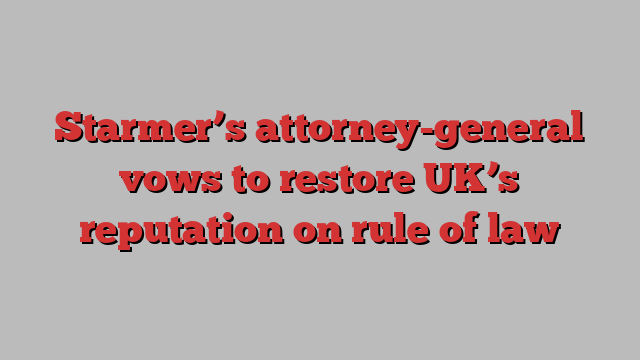
Unlock the Editor’s Digest for free
Roula Khalaf, Editor of the FT, selects her favourite stories in this weekly newsletter.
The attorney-general for England and Wales has pledged to reestablish the UK as a global leader on the rule of law, criticising the last government for “undermining” Britain’s reputation both at home and abroad.
In his first interview since taking office in July, Lord Richard Hermer KC told the Financial Times he was shocked by actions taken under the Conservative government over issues including Brexit and the Rwanda asylum scheme, which saw the Tories try to breach international law and undermine the courts.
“Over the last 14 years, perhaps over the past six years in particular, there has been a steady undermining . . . of core principles by the last government,” said Hermer.
“A new government coming out to say we are good faith actors on the international stage, that when we sign a treaty we’re going to keep to it and not seek to wriggle out of it within five minutes, before the ink is dry, is so valuable for investment purposes,” Hermer added.
Hermer’s comments came as Labour attempted to woo business executives at Monday’s international investment summit. In a speech at research institute the Bingham Centre on Monday night, the attorney-general said that shoring-up the UK’s role as a leader in law was vital to economic success.
Hermer, 56, was a surprise appointment following Labour’s win at the UK general election in July. A human rights barrister known for his work on high-profile cases including the alleged cover up of killings by British forces in Afghanistan, Hermer came straight from the Bar rather than a career in politics.
The remit as attorney-general is varied and covers everything from advice to ministers to overseeing the Serious Fraud Office and Crown Prosecution Service. He may also represent the government in important court cases.
Since taking up the job Hermer has already been confronted with a number of major international challenges including the Israel-Hamas war and the UK’s decision to give up sovereignty of the Chagos Islands to Mauritius in return for securing a UK-US military base.
Within weeks of Labour’s election win the UK dropped a proposed challenge to the International Criminal Court’s right to issue an arrest warrant against Israeli Prime Minister Benjamin Netanyahu.
Hermer will not talk about his role in that decision but said the UK would “comply” with its legal obligations over any potential warrant from the court.
“This government is determined not to do anything that undermines the work of the ICC,” said Hermer. “As with any individual and any scenario relating to the ICC we would comply with our lawful obligations.”
In an open letter published in the FT in October 2023, Hermer was one of a group of Jewish lawyers to call on Israel to observe international laws in the wake of the Hamas attacks.
While Hermer’s selection as attorney-general comes at a key moment given his experience in international law and the global crises the UK is navigating, the government is also facing domestic challenges amid crumbling court infrastructure and a record backlog of criminal cases.
Such issues are not Hermer’s direct responsibility but do affect the CPS and SFO, which he superintends, and add to the urgency to expand the economy to provide more funding for such areas, he said.
Hermer, who says he is “incredibly private”, is now dealing with the kind of scrutiny that comes with such a public role. The Sunday Times reported at the weekend that he had intervened to allow for a police escort to chaperone Taylor Swift to her UK concerts this summer after Scotland Yard said the protection would breach its protocols.
According to one government source, it is normal for the attorney-general to be involved in discussions about security.
The attorney-general’s office said the situation was “solely an operational decision for the police”. The Metropolitan Police said it is “operationally independent” and doesn’t “comment on the specific details of protective security arrangements”.
Hermer, who grew up in Wales, has known Sir Keir Starmer since the mid-1990s when the pair both worked at Doughty Street Chambers. Hermer said that Starmer took him out for dinner on his first night in London and the two have been friends ever since.
“[It was] a very typical Keir thing to do,” said Hermer. “I’m conscious that often how he’s portrayed now doesn’t always reflect the person that I know.”
While Hermer’s appointment as the government’s chief legal adviser was unexpected, he had advised Labour previously, most notably on a Conservative bill last year that sought to stop public bodies from taking into account human rights abuses when making procurement decisions.
Still, Starmer’s decision to give Hermer the position was a shock to many, including former shadow attorney-general Emily Thornberry who was expected to take the role.
“It’s never an office I ever sought, let alone ever asked for,” said Hermer. “[But] it was obviously not an offer you could say no to.”